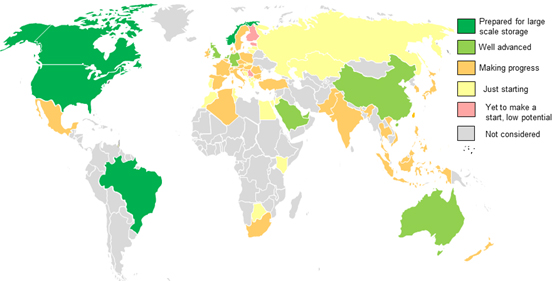Insights and Commentaries
Global storage readiness assessment
15th May 2015
Topic(s): Capacity development, CO2 storage, Engineering and project delivery, law and regulation, Policy
Carbon capture and storage (CCS) deployment must be rapidly accelerated if the world is to meet its intended goal of limiting temperature increases to two degrees celsius. For accelerated CCS deployment suitable storage sites must be available. A recent report commissioned by the Global CCS Institute assesses the level of development of storage capacity by country, or "storage readiness". In this Insight the Institute's Senior Adviser for Storage (Asia Pacific), Chris Consoli introduces the report and discusses the implications for CCS development.
The recent Intergovernmental Panel on Climate Change (IPCC) fifth assessment report highlighted the vital role of carbon capture and storage (CCS) in efforts to address climate change. If CCS is going to play its effective role, between now and 2050, 120 gigatonnes of greenhouse gases (mainly CO2) will need to be geologically stored. It is estimated that this will require over 3000 large-scale CCS projects (IEA, 2014; IPCC, 2014; Global CCS Institute, 2014).
Image from IEA CCS technology roadmap © OECD/IEA 2013, IEA Publishing Licence: https://www.iea.org/t&c/termsandconditions
The rapid acceleration of CCS between now and 2050 requires an unprecedented deployment of infrastructure and technological innovation. A requirement for this massive scale-up is the identification of suitable CO2 geological storage sites globally.
A global assessment of the “readiness” of countries to undertake wide-scale deployment of CCS projects has been completed by the Global CCS Institute and Rick Causebrook, a well known geological storage scientist with expertise in geological storage assessments and capacity studies.
What is storage readiness?
This global assessment defines ‘storage ready’ as a country that has, within their jurisdictional boundaries, the ability to safely and securely inject millions of tonnes of CO2. For a country to advance to this stage they had to meet a series of criteria including:
- Strong knowledge of their storage resource,
- Applied research and development programs,
- Achieved deployment of actual injection projects.
The inaugural report just published is a 2014 snapshot of 60+ countries and illustrates that significant work is required to ensure more countries are 'storage ready'.

Figure 1 World map showing countries colour coded by storage readiness. Image supplied.
Storage ready nations
The 2014 assessment shows only four countries are prepared for storage including:
- Brazil
- Canada
- Norway
- USA
Seven countries are rapidly progressing towards being storage ready, including: Australia, China, Germany, Netherlands, Saudi Arabia, UAE, and the United Kingdom. These countries are actively pursuing CCS technologies to reduce their emissions.
These storage ready countries, and those rapidly progressing, have a strong understanding of their storage potential due to a mix of three key elements:
- History of research and development programs focused on CCS
- Open, innovative and advanced oil and gas industry
- Incentives for CCS — e.g. public funding, CO2 tax, or utilisation of CO2
These countries have also completed, to various degrees of detail, regional to site-scale storage assessments and have a commitment to dedicated research programs on their national storage resource. They have pilot, demonstration and/or commercial-scale CCS projects that are operational, under construction, or in advanced planning stages.
The majority of nations (31) sit within the ‘making progress’ category. Collectively, these nations recognise the potential of CCS to mitigate emissions and have a solid understanding of their storage prospectivity. In this category, there are nations that are leading CCS players in capture and/or other areas of CCS research, but have a lower potential for storage within their national jurisdiction (eg. Japan, South Korea). In addition, this category also contains nations with strong storage prospects that are, and need to, undertake further storage assessment to progress to actual injection, such as Malaysia, Mexico, Poland, South Africa as examples.
Outcomes
In this report a nation’s geological storage preparedness was assessed against their potential CCS interest, which is a proxy for a nation’s emissions, and/or their economic reliance on fossil fuel exports. Encouragingly, many countries with a high CCS interest (high emissions, or fossil fuel exports) are also either storage ready, or in the well-advanced category.
The report recommended that advanced countries assist those in the ‘making progress’ category through cooperative, regional mapping programs and promote the potential of CCS through knowledge sharing programs. There are already some good examples of this happening.
The importance of pilot storage projects, or participating in such projects as a collaborating partner, was also emphasised in this report. The actual injection of CO2 at any scale means researchers, scientists, engineers and technology experts, regulators, and suppliers have taken the necessary steps (geological, engineering, and regulatory) to realise CCS in their nation. It also proves that storage, under local conditions is possible in their country and this is beneficial for public awareness. The assessment is a living document designed to reflect the evolution of CCS and the Global CCS Institute intends to update it regularly.